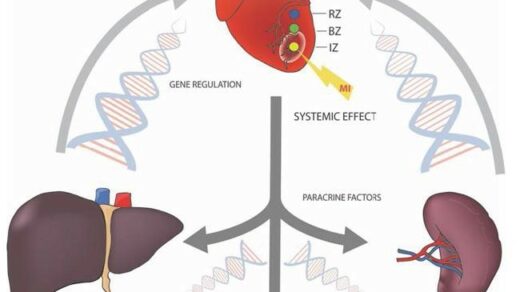“Our results demonstrate that inhibition of miR-10b using MN-anti-miR10b decreases the stemness of breast cancer cells, supporting dedifferentiation as a mechanism through which the nanodrug may function as a therapy.”
While there have been significant improvements in breast cancer detection and treatment, the outlook for metastatic breast cancer remains bleak, with only a 30% five-year survival rate. This is largely due to existing therapies’ inability to effectively target the unique characteristics of metastatic cells. One key factor in metastasis is miR-10b, a small noncoding RNA known to influence cancer cell invasion, migration, viability, and proliferation.
In their paper, researchers Alan Halim, Nasreen Al-Qadi, Elizabeth Kenyon, Kayla N. Conner, Sujan Kumar Mondal, Zdravka Medarova, and Anna Moore from Michigan State University’s Precision Health Program, College of Human Medicine, and College of Veterinary Medicine, and Transcode Therapeutics Inc. in Newton, Massachusetts, shared findings showing that inhibiting miR-10b impairs breast cancer cell stemness. Their research paper, entitled, “Inhibition of miR-10b treats metastatic breast cancer by targeting stem cell-like properties” was published in Volume 15 of Oncotarget on August 26, 2024.
THE STUDY
In this study, researchers investigated the effects of repeated MN-anti-miR10b treatments on local and distant metastases. They observed over 93% inhibition of miR-10b in cryosectioned samples and noted reduced miR-10b expression in lymph node and lung metastases after weekly dosing. RNA sequencing revealed upregulation of genes, including ATP6V0D2, EPHB2, KLF4, KLF7, NCOR2, TMEM268, and VDR, associated with developmental processes. Functional enrichment analysis highlighted biological processes such as cell differentiation and tissue development in these upregulated genes.
The researchers also explored the link between miR-10b expression and stem-like properties in cancer cells. Elevated miR-10b levels were found in stem-like breast cancer cells. MN-anti-miR10b reduced stemness-related traits in MDA-MB-231 and MCF-7 cells, as shown by reduced aldehyde dehydrogenase activity and smaller spheroids in tumorsphere assays. These results suggest that inhibiting miR-10b effectively targets stem-like properties in metastatic breast cancer, offering potential therapeutic benefits.
DISCUSSION
Inhibition of miR-10b has been shown to be an effective treatment strategy for metastatic breast cancer. The nanodrug MN-anti-miR10b was found to significantly downregulate miR-10b expression in cancer cells, leading to decreased cell migration, invasion, proliferation, and viability. The researchers investigated the time course of miR-10b inhibition and confirmed that the nanodrug effectively reduced miR-10b expression in both regional and distant metastases. RNA sequencing analysis revealed that the inhibition of miR-10b by MN-anti-miR10b upregulated genes associated with developmental processes, indicating an effect on the stem cell-like properties of cancer cells.
The study also demonstrated a correlation between miR-10b expression and stemness in cancer cells. Cells with increased stemness, identified by the CD44+/CD24- surface marker phenotype, showed higher miR-10b expression. Treatment with MN-anti-miR10b resulted in decreased stemness-associated properties, as observed through the Aldefluor assay and tumorsphere formation assays. These findings suggest that MN-anti-miR10b has a differentiation effect on cancer cells and targets dedifferentiated, stem cell-like cancer cells. The upregulation of genes associated with developmental processes by MN-anti-miR10b further supports the notion that cancer cells overexpressing miR-10b are in a less-developed, more stem cell-like state.
Overall, the study provides valuable insights into the therapeutic effects of miR-10b inhibition using MN-anti-miR10b in metastatic breast cancer. The findings suggest that targeting miR-10b and stem cell-like properties in cancer cells could be a promising approach for the treatment of various types of metastatic carcinoma.
IN CONCLUSION
Despite the progress made in breast cancer detection and treatment, the prognosis for metastatic breast cancer remains poor. A significant factor contributing to metastasis is miR-10b, a small RNA molecule involved in cancer cell invasion and migration. The researchers have developed a nanodrug called MN-anti-miR10b that delivers antisense oligomers to inhibit miR-10b in cancer cells.
In mouse models of metastatic triple-negative breast cancer, MN-anti-miR10b has shown promising results. It prevents the development of metastases and can eliminate existing metastases when combined with chemotherapy, even after treatment cessation. Recent studies have also linked miR-10b to the acquisition of stem cell-like properties in cancer cells, including chemotherapy resistance.
In this study, the researchers provide transcriptional evidence that inhibiting miR-10b with MN-anti-miR10b activates developmental processes in cancer cells. They also demonstrate that stem-like cancer cells have higher expression of miR-10b. Importantly, treatment of breast cancer cells with MN-anti-miR10b reduces their stemness, indicating that the nanodrug can effectively target and impair the stem-like properties of breast cancer cells.
These findings highlight the potential of MN-anti-miR10b as a treatment option for breast cancer subtypes characterized by stem-like properties. By inhibiting miR-10b, the nanodrug could disrupt the stemness of cancer cells and may offer a new approach to improve the outcomes for metastatic breast cancer patients.
Click here to read the full research paper in Oncotarget.
—
Oncotarget is an open-access, peer-reviewed journal that has published primarily oncology-focused research papers since 2010. These papers are available to readers (at no cost and free of subscription barriers) in a continuous publishing format at Oncotarget.com.
Oncotarget is indexed and archived by PubMed/Medline, PubMed Central, Scopus, EMBASE, META (Chan Zuckerberg Initiative) (2018-2022), and Dimensions (Digital Science).
Click here to subscribe to Oncotarget publication updates.
For media inquiries, please contact media@impactjournals.com.



